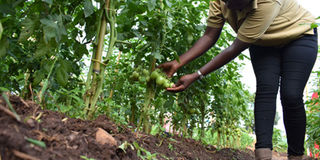New farming model brings in more cash

Rewarding. Juliet Vusia, one of the employees looking after the tomatoes at the demonstration gardens in Bweyogerere in Wakiso district. Photos by MICHAEL KAKUMIRIZI.
What you need to know:
Spinach, sukuma wiki, onions, tomatoes, peas, basil, parsley, capsicum, herbs, chillies, mint, strawberries and indigenous vegetables are some of the crops that can be grown in the vertical garden, with a standard one having a capacity of up to 44 crops, writes Nicholas Akasula.
Polly Magero’s one-acre farm in Bweyogerere, Wakiso District, is the envy of many because of the various agribusiness ventures he engages in.
The farmer grows arrowroots, tree seedlings, okra, red pepper, green pepper, mint, carrots, cabbage, onions and tomatoes, among other vegetables. Magero is busy packing tree seedlings in small plastic bags for a client when the Seeds of Gold team arrives.
“I have to deliver these tree seedlings to the next village. Demand is high because of the rainy season,” says Magero who partnered with Sammy Babu under Golden Bull Uganda Limited.
How he started
“I started farming in 2010 with Shs2m. The traditional vegetables I grew were cabbages, onions and tomatoes on an eighth acre,” he recounts, noting that he bought the seedlings from Babu who has since become a business partner.
Diversifies
In 2016, Magero had a lengthy discussion with Babu after buying seedlings. The talks culminated into a partnership and the two agreed to trade under Golden Bull Uganda with Magero as the general manager while Babu the chief executive officer (CEO). The two combined resources and diversified into other vegetables such as okra, cucumber, coriander (dhania), eggplant, lettuce, kale and capsicum.
“There was good market for the crops in Kampala, and there still is. I would deliver my produce to specific families, earning Shs100,000 in a good week.”
Big money
“Babu proposed expansion and late last year we acquired land in Gulu where we have established the farm. The farm sits on more than 50 acres. With a big chunk of land, the duo have introduce more vegetables. The new vegetables include cauliflower, bottle gourd, beetroot, radish, Chinese carrot, yellow pearl peas, sweet pepper F1 and French beans. We sell each kilogramme of tomatoes for Shs5,000 on the local market. We also earn Shs4,500 per bottle guard. Our biggest customers are Chinese and Indians,” says Magero.
The two farmers further have 3,500 arrowroot plants on quarter acre. This is his third season of growing the crop. “We started in January last year with 250 plants. After six months, they earned us Shs500,000. Our third harvest will be in July, and we expect between Shs2m and Shs5m,” says Magero.
Value addition
To earn more from their agribusiness, Magero and Babu have decided to add value to their vegetables. They raised funds from friends to capitalise Golden Bull. “We reached out to friends and banks and we were able to raise capital,” says Babu. With the capital, Babu says they invested in machinery. “We needed a complete system that selects the right seed, sorts it and packages it,” he says. The machinery cost the two farmers about Shs500m. “We grow our own crops, harvest them, and dry them before packaging to sell as seedlings to other farmers. The business is booming and growing each day,” says Babu.
Big launch
While launching the Golden Bull factory where the seedlings are packaged, Silas Aogon encouraged other farmers to pick a leaf from the two model farmers in Magero and Babu. “We want all our farmers to embrace value addition. When you add value into your crop you stand to earn more,” said Aogon.
Advice
Aogon, who is a member of the agriculture committee in parliament, says while mixed farming is beneficial, a farmer risks burning out as he spreads his resources such as time, money and labour to the limit.
“One should plan carefully lest this kind of farming turns out to be a burden as the farmer may be unable to maximise productivity. There is also a challenge with diseases, which may spread from one crop to another, but overall, this kind of farming is better than mono farming.”




